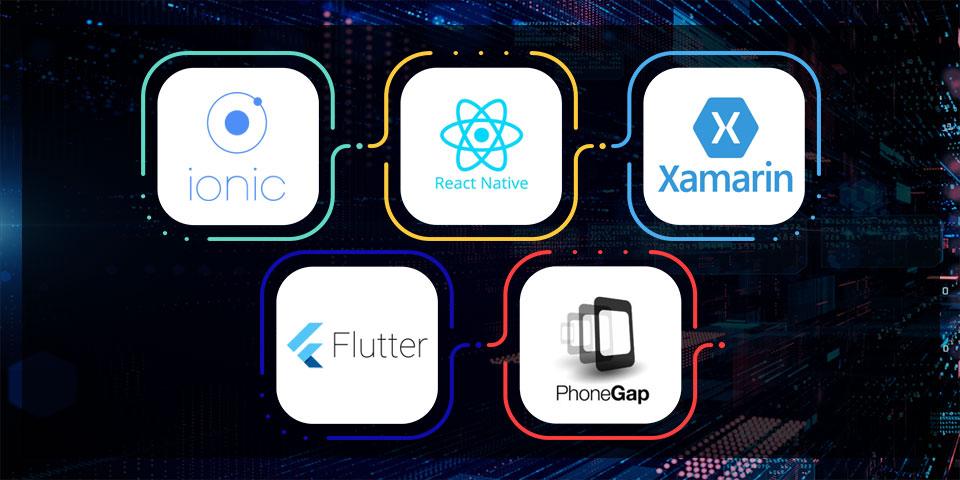Top Mobile App Development Framework for Your Next Project
by admin
| October 7, 2023
When you need to go shopping, order dinner, find a place to have a coffee and your favorite cheesecake, or any other online activity you do, what comes first to your mind? Having your mobile phone by your side, right? Smartphones have become our daily companions since these devices simplify our everyday tasks. Mobile app development is a constantly evolving field, with developers always seeking new and efficient ways to build captivating applications. Mobile app technologies are rapidly evolving and apps are now an integral part of the online world. Choosing the right framework can significantly impact the development process, speed, and overall performance of your mobile app. Businesses are these days moving towards mobile apps as it offer great convenience and allow them to expand without facing much hassle.
Mobile app development holds immense importance in today’s digital era, playing a transformative role in how businesses and individuals interact with technology. Mobile apps are powerful tools that allow reaching and engaging a vast audience while delivering a convenient and personalized experience. For businesses, apps offer a direct channel to connect with customers, drive sales, enhance brand visibility, and gather valuable data for decision-making. They enable seamless transactions, real-time communication, and instant access to information, fostering customer loyalty and satisfaction. Mobile app development empowers businesses to adapt to evolving market trends, stay competitive, and deliver exceptional user experiences, ultimately leading to growth and success in the digital landscape.
How are mobile apps helping transform the business world?
Mobile apps are becoming a must-have for businesses to expand their reach to a wider audience and attain prospected success. These can become a tool to help you achieve more than what you can with a website or desktop-based software. A mobile app when built with the right and innovative technology provides businesses with a competitive advantage that no one can ever think of. People are now ditching and lowering the use of desktops and moving towards mobile phones to access data, compare businesses, and then make online purchases. Mobile apps allow for personalized user experiences through preferences and behavior analysis. Tailored recommendations and push notifications can be sent to keep users engaged and informed about promotions, new arrivals, or relevant updates.
When users find what they are looking for with convenience, they tend to become paying customers. The ease of making online purchases through mobile apps significantly boosts sales contributing to a higher conversion rate, ultimately leading to increased revenue.
Types of mobile app development
When you’re developing a mobile app, there are a lot of things that come into consideration such as cost, functionality, and optimization and you have two options to decide, i.e., native or cross-platform app development.
Native Development
Let’s understand with an example, you need to speak to a person who is a Spanish native and doesn’t know any other language, what would you do? You would learn Spanish to talk to him. This is the way native mobile app development functions; each platform has its native language like Android has Kotlin while iOS has Swift and web browsers use JavaScript.
Cross Platform Development
Let’s take the previous example, you need to speak to a person who speaks Spanish, but here you get the benefit that he also understands and speaks English. This will make communication very easy as you have a common language to interact in. This is exactly how a cross-platform app works. Here, rather than writing code again and again as you do in native, one code can be used for multiple platforms. Common examples of the cross-platform app are Facebook Ads and Tesla.
Top mobile app development frameworks that are popular
React Native
React Native, developed by Facebook, has become a go-to framework for building cross-platform mobile applications. It allows developers to use a single codebase for both iOS and Android platforms, reducing development time and costs. React Native offers a rich set of pre-built components and a strong developer community, making it easier to create robust, high-performance applications.
Flutter
Google’s Flutter is gaining rapid popularity due to its ability to create visually appealing and natively compiled apps for mobile, web, and desktop from a single codebase. Flutter provides a comprehensive set of widgets and layouts to build stunning interfaces and deliver a consistent user experience across platforms.
Ionic
Ionic is an open-source mobile app development framework that leverages web technologies such as HTML, CSS, and JavaScript to build cross-platform mobile applications. Known for creating progressive web apps (PWAs) that are highly efficient, fast, and offer a seamless experience on various devices. Ionic comes with a wide range of pre-designed components and themes, simplifying the development process.
Xamarin
Xamarin, a Microsoft-owned framework, allows developers to build cross-platform mobile applications using C# and .NET. It offers a single codebase approach and allows for native API access, ensuring the app’s performance matches native applications. Xamarin is widely appreciated for its robustness and the ability to reuse code, making it an attractive choice for developers. Developers can design the UI using XAML, a markup language similar to HTML for a consistent look and feel across different platforms. The framework also supports platform-specific customization, allowing developers to fine-tune the UI for each platform as needed. Xamarin also integrates seamlessly with Visual Studio, Microsoft’s popular integrated development environment (IDE).
NativeScript
NativeScript enables developers to build truly native mobile applications using familiar web technologies like JavaScript, Angular, or Vue.js. It offers direct access to native APIs, delivering high performance and a genuine native user experience. With a strong focus on code reusability, NativeScript empowers developers to efficiently develop for both iOS and Android. By utilizing NativeScript, developers can write code in familiar languages like JavaScript, TypeScript, or Angular. The framework then translates this code into native APIs and UI components for both iOS and Android.
Choosing the right mobile app development framework is crucial for the success of your project. Each framework comes with its unique set of features, advantages, and capabilities. Whether you opt for React Native for streamlined cross-platform development, Flutter for visually stunning apps, Ionic for efficient progressive web apps, Xamarin for C# and .NET compatibility, or NativeScript for bridging the gap between web and native, always align your choice with your project requirements and objectives.
 Development Services
Development Services Technologies
Technologies ICO
ICO ICO Marketing
ICO Marketing










